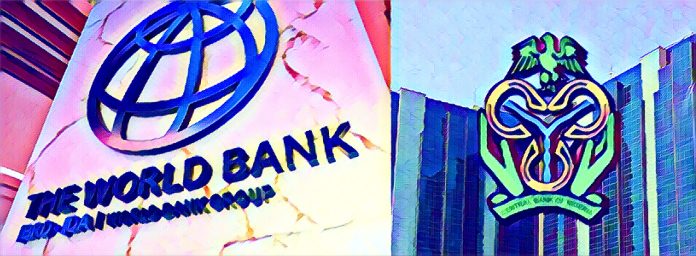KEY POINTS
- The World Bank advises CBN to cease ad-hoc FX auctions for a structured approach.
- Strategic reserves, market liquidity, and a unified exchange rate are crucial for naira stability.
- Non-performing loans in Nigeria’s banking sector have increased, reaching 5.1 percent in early 2024.
In favour of a regular, open framework for interventions, the World Bank has advised the Central Bank of Nigeria (CBN) to discontinue its irregular foreign exchange (FX) auctions.
The World Bank emphasized the necessity of an exchange rate policy that preserves a single, market-driven rate while increasing liquidity in the FX market to reduce naira volatility in its most recent Nigeria Development Update.
The CBN used the retail Dutch auction method to hold a large sale in August, with a total value of $876 million.
By supplying dollars to end users through 26 banks at a rate of N1,495 per dollar, this represented a break from the prior practice of selling foreign exchange to Bureau De break operators.
The intervention’s objectives were to alleviate liquidity issues, ease naira pressure, and promote market stability.
But according to the World Bank analysis, the currency market might be strengthened even more if market players were given more freedom to trade foreign exchange.
According to the research, “improving fiscal revenue, drawing in investment, and attaining inclusive growth all depend on maintaining a single, market-reflective rate.”
World Bank stresses the importance of foreign reserves
The World Bank also underlined that maintaining foreign reserves is essential to maintaining the value of the naira and providing a stable economic basis for both domestic and international trade.
Strategic reserves, the report noted, would allow the CBN to anchor exchange rate expectations based on economic fundamentals rather than targeted rate levels.
The bank contended that the CBN could improve liquidity without the need for ad hoc auctions by urging foreign oil companies to route foreign exchange sales through official channels and enabling legal remittances.
Speaking at the recent IMF/World Bank annual meetings, Finance Minister Wale Edun said that although international ideas are useful, they don’t always line up with domestic economic interests.
According to Punch, Edun emphasized that the Nigerian government may not implement all of the policy recommendations put forth by international financial organizations, citing the oversubscription of a recent $500 million domestic bond.
Rising non-performing loans and tightened monetary policy
Concerns regarding the state of Nigeria’s banking industry were also raised by the World Bank report, which stated that non-performing loans (NPLs) increased from 4.5 percent in Q1 2023 to 5.1 percent in Q1 2024.
With strong inflation and a weakening naira, this number is higher than the prudential threshold of 5 percent, suggesting a minor rise in the risk of loan default. Another indicator of financial strength, the capital adequacy ratio, decreased from 14.2 percent in Q1 2023 to 11.1 percent in Q1 2024.
The central bank of Nigeria (CBN) has responded to these challenges by pursuing aggressive open market operations (OMOs).
In the first eight months of 2024, the CBN collected over N6.6 trillion naira, which is 30 percent more than the entire amount collected over the preceding three years.
By drawing foreign exchange inflows and reducing naira liquidity, the recent increases in interest rates on standing deposit and lending facilities have forced market rates to match the monetary policy rate (MPR), stabilizing foreign exchange reforms.
Amid increased scrutiny of Nigeria’s monetary policies and mounting worries about the nation’s financial stability, the World Bank issued a policy advise to the CBN.
The argument over how to effectively accomplish a single, stable exchange rate while fostering economic expansion is still going strong as Nigeria looks to stabilize its currency.



